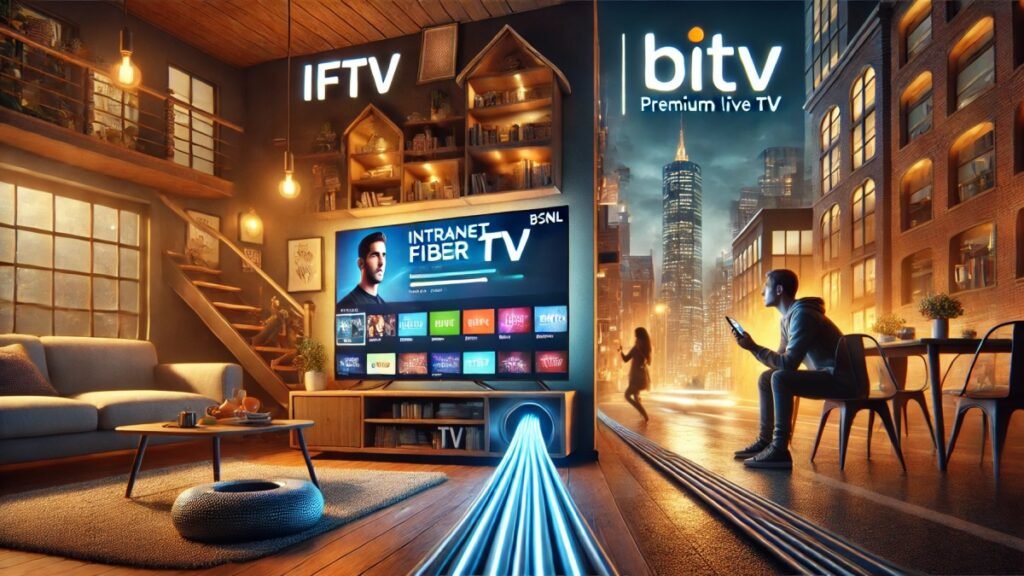
Key Highlights
- New Logo, New Services: BSNL introduces a refreshed identity with its new logo and launches innovative services to take on private telecom leaders.
- IFTV Service: Offers 500+ free live TV channels for FTTH customers, already operational in multiple states.
- BiTV Service: Provides 300 premium live TV channels free for mobile users, starting in Puducherry.
- Customer Growth: Added 5 lakh new subscribers in October 2024, strengthening its market position.
- Competitive Edge: BSNL aims to disrupt Jio and Airtel’s dominance in the broadband and mobile segments.
BSNL’s Bold Move: Revolutionizing Telecom with IFTV and BiTV
New Delhi: Bharat Sanchar Nigam Limited (BSNL) has embarked on a transformative journey in 2024 by unveiling a new logo and launching cutting-edge services aimed at redefining its role in the competitive telecom industry. The state-owned telecom operator is challenging private giants like Reliance Jio and Airtel with its innovative offerings, IFTV (Intranet Fiber TV) and BiTV, designed to enhance customer experience and accessibility.
IFTV: Free Live TV for Fiber Customers
BSNL’s IFTV service leverages its fiber-based internet to deliver over 500 free live TV channels to its FTTH (fiber-to-the-home) subscribers.
- Initially launched in Madhya Pradesh and Tamil Nadu, the service is now available in Punjab, Haryana, and Puducherry.
- This initiative provides subscribers with a diverse range of channels without any additional cost, making it a compelling alternative to similar services offered by competitors like JioFiber and Airtel Xstream.
BiTV: Premium Channels Free for Mobile Users
Catering to mobile users, BSNL has introduced the BiTV service, which offers access to over 300 live TV channels, including premium ones, completely free of charge.
- The service has been rolled out in Puducherry as a pilot project, with plans for a nationwide expansion.
- BiTV is poised to attract mobile users seeking quality content without the hefty subscription fees associated with other platforms.
Impact on the Telecom Industry
BSNL’s strategic moves are creating ripples in the telecom sector, intensifying competition with private players:
- Reliance Jio dominates the broadband segment with its JioFiber and JioAirFiber services.
- Airtel competes with its Xstream Fiber, but BSNL’s aggressive pricing and innovative services are set to challenge their market stronghold.
Customer Growth and Future Plans
BSNL’s efforts are paying off, as evident from the 5 lakh new subscribers added in October 2024, according to the Telecom Regulatory Authority of India (TRAI).
- Services like IFTV and BiTV are helping BSNL regain its foothold in the telecom market.
- The company plans to expand these services nationwide, making them accessible to millions of users.
What is Intranet Fiber TV (IFTV)?
Intranet Fiber TV (IFTV) is a fiber-based television service provided by Bharat Sanchar Nigam Limited (BSNL). It uses fiber-to-the-home (FTTH) technology to deliver live TV channels over a high-speed internet connection. Here’s how it works and its key features:
How IFTV Works
- Fiber Connection: The service is integrated into BSNL’s existing fiber network, allowing customers to access TV channels through their internet connection.
- No Need for Satellite or Cable: Unlike traditional TV services, IFTV does not rely on satellite dishes or cable connections. It streams TV content over the internet.
Key Features
- Free for FTTH Subscribers: IFTV is available free of charge for BSNL’s FTTH customers.
- Extensive Channel Lineup: Offers access to 500+ live TV channels, covering a wide range of genres such as news, entertainment, sports, and regional content.
- High-Quality Streaming: Delivers buffer-free and high-definition content due to the robust fiber infrastructure.
- Current Availability: Initially launched in states like Madhya Pradesh and Tamil Nadu, the service is expanding to Punjab, Haryana, and Puducherry.
Benefits of IFTV
- Enhances the value of BSNL’s FTTH service by bundling TV entertainment.
- Competes directly with other fiber-based TV services like JioFiber and Airtel Xstream.
What is BiTV?
BiTV is BSNL’s mobile-based television service, designed to cater to users who prefer watching TV content on their smartphones or tablets. Unlike IFTV, which is tied to a fiber internet connection, BiTV is accessible via mobile internet.
Key Features of BiTV
- Mobile-Exclusive Service: Available on smartphones and tablets, making it ideal for on-the-go viewing.
- Free for BSNL Mobile Users: BSNL mobile subscribers can access over 300 live TV channels, including premium channels, without any subscription fee.
- Wide Range of Channels: Offers diverse programming, including news, entertainment, sports, and regional content.
- Initial Launch: The service is currently operational in Puducherry, with plans to expand nationwide.
Benefits of BiTV
- Targets the mobile-first generation and cord-cutters who prefer streaming content.
- Differentiates BSNL from competitors by offering premium live TV channels for free.
Comparison: IFTV vs. BiTV
| Feature | IFTV | BiTV |
|---|---|---|
| Device | TV (via FTTH connection) | Smartphones and tablets |
| Target Audience | FTTH customers | BSNL mobile users |
| Cost | Free for FTTH subscribers | Free for mobile subscribers |
| Channels | 500+ live TV channels | 300+ live TV channels (includes premium) |
| Launch Area | MP, TN, Punjab, Haryana, Puducherry | Puducherry (nationwide rollout planned) |
| Technology | Fiber-based streaming | Mobile internet streaming |
Both IFTV and BiTV represent BSNL’s push into digital entertainment, offering competitive and cost-effective alternatives to services provided by private telecom operators. These initiatives are expected to enhance BSNL’s appeal among a diverse range of customers, from home users to mobile-first audiences.

A New Era for BSNL
With its renewed focus on innovation and customer satisfaction, BSNL is emerging as a formidable competitor in the telecom industry. The launch of IFTV and BiTV reflects the company’s commitment to leveraging technology to provide affordable, high-quality services to its customers, challenging the dominance of private players and paving the way for a resurgence of the public sector in telecom.


















































